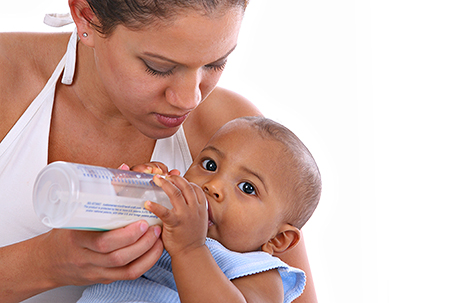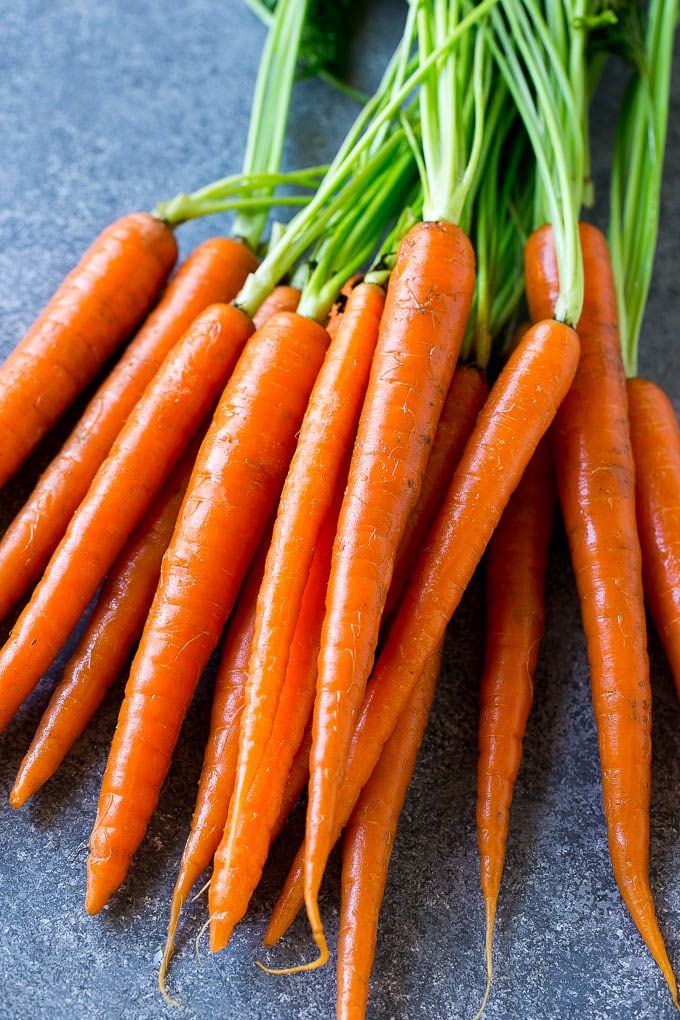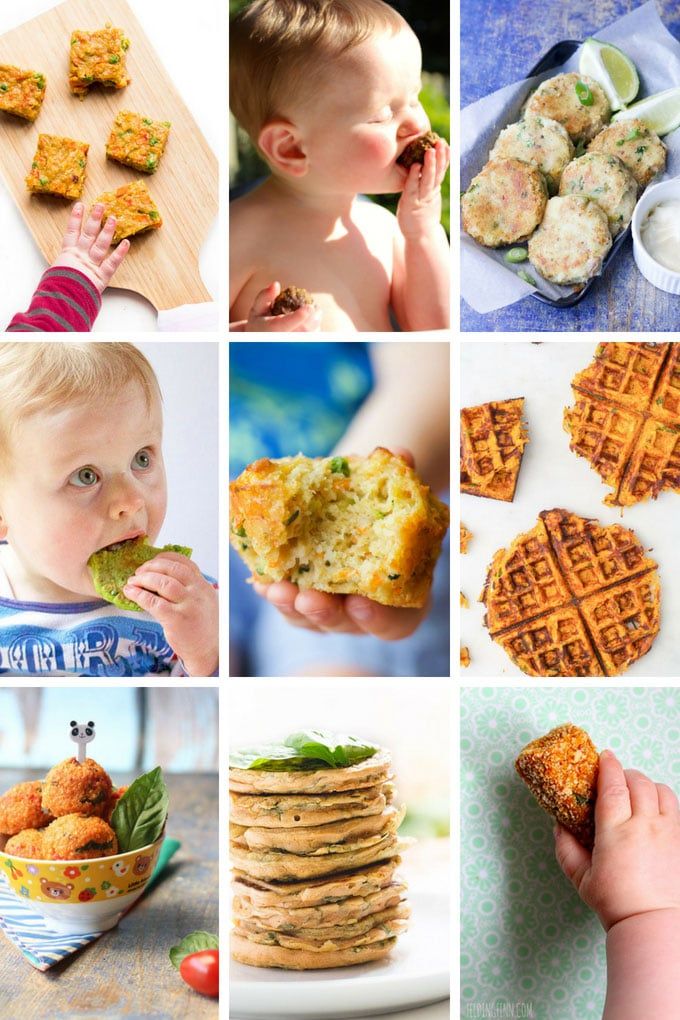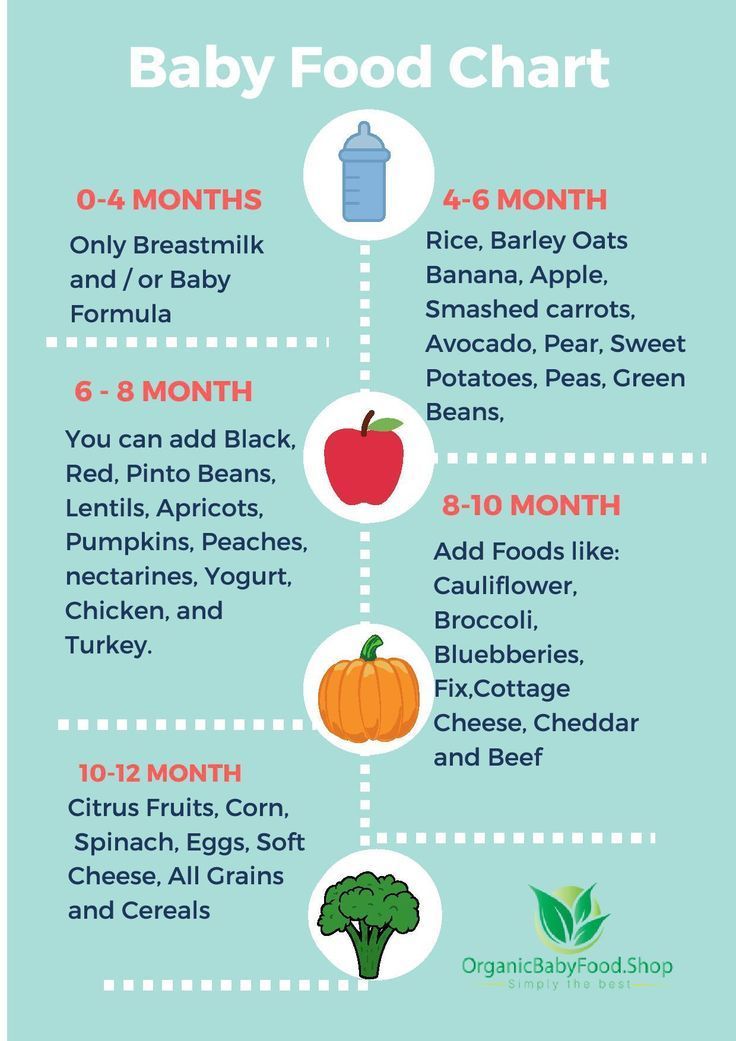What foods trigger eczema in babies
7 Foods to Avoid in Babies and Toddlers with Eczema
Also known as atopic dermatitis, eczema is a common condition characterized by red, itchy, and inflamed skin.
Although eczema can affect anyone, it’s especially common among children. In fact, about 60% of cases develop within the first year of life (1).
Many factors can worsen eczema flare-ups, including foods.
Research shows that certain foods may trigger eczema in 20–30% of cases of moderate to severe eczema. Additionally, foods are more likely to worsen symptoms in children and infants under age 5 (2).
While foods do not directly cause eczema, making dietary changes could help reduce symptoms, especially for those who have a sensitivity or allergy to specific foods (3).
In children with a confirmed food allergy, eliminating trigger foods from the diet may significantly improve symptoms of eczema within just 1–2 months (4).
However, keep in mind that it’s not necessary to avoid all the foods listed below to help manage your child’s eczema.
SummaryCertain foods may worsen symptoms of eczema, especially in children and infants. However, it depends on the child’s particular allergies or sensitivities, so speak with a healthcare professional to determine which foods might be best to eliminate.
Preventing food allergies
Introducing common allergen foods to an infant early in life may actually help prevent them from developing food allergies, including to eggs and peanuts (5).
If you’re considering eliminating certain foods from your child’s diet or you’re concerned about your child developing food allergies, speak with a healthcare professional. They can help you develop a diet plan based on your child’s needs.
Research has shown that eliminating one or more of these foods from the diet may significantly improve symptoms of eczema in some children.
1. Dairy
Not only is a cow’s-milk allergy the most common food allergy in young children, but dairy products like milk, yogurt, and cheese are also common triggers for eczema (6).
One study in 132 children with food-triggered eczema found that 39% of children developed an immediate reaction after consuming cow’s milk (2).
A 2019 review reported that infants with eczema were six times more likely to have an allergy to cow’s milk, eggs, or peanuts at 12 months of age compared with infants without eczema (7).
Fortunately, there are several simple plant-based milks available as an alternative to cow’s milk, including soy milk, almond milk, and cashew milk.
However, be sure to check the ingredients lists carefully, as some of these products are high in calories and added sugar.
2. Fish and shellfish
The term “shellfish” refers to any aquatic animal that has a shell-like exterior, including crabs, lobsters, oysters, mussels, and shrimp. Meanwhile, most types of fish, including salmon, trout, tuna, and tilapia, have fins and scales.
Although both fish and shellfish are highly nutritious and can be great sources of protein and omega-3 fatty acids, they can also worsen symptoms of eczema for many children.
This is because fish and shellfish allergies are common and can cause a wide range of side effects, including hives, itching, and eczema (8, 9).
While some children may be sensitive to finned fish or shellfish, others may experience reactions only to certain types, such as crustaceans (like shrimp and crab) or mollusks (like oysters and clams) (8).
A pediatrician or registered dietitian can help determine which specific types of seafood may trigger symptoms for your baby or toddler.
3. Soy products
For those with a soy allergy, consuming soy products like soy milk, tofu, or edamame can cause an immune response, which could trigger skin reactions such as eczema (10).
Compared with allergies to other major food allergens, soy allergies are not nearly as common (11, 12).
For example, one 2013 study in 175 people with eczema found that around 30% had an immune reaction to soy. However, only about 3% of people experienced symptoms, such as hives and itching, after consuming soy (13).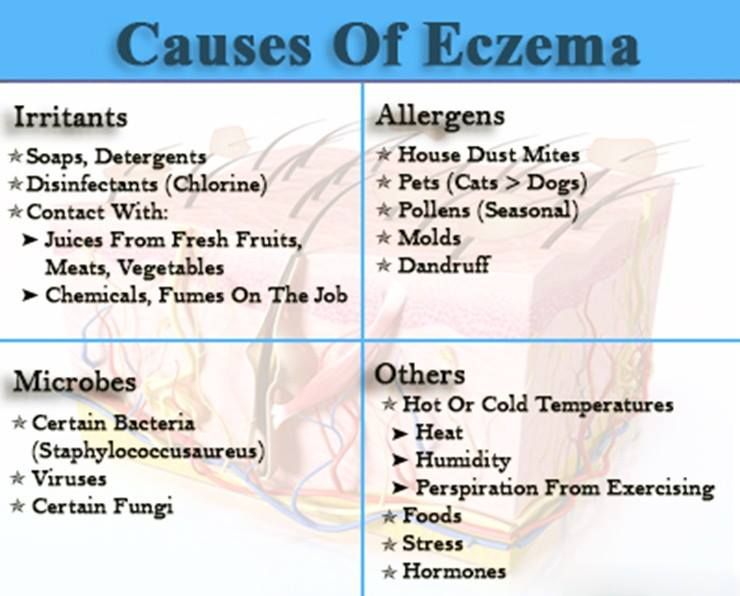
If your baby or toddler has a sensitivity to soy products, keep in mind that many processed foods contain soy-based ingredients, all of which could worsen symptoms of eczema. Examples include (14):
- soy sauce
- tamari
- soy protein
- textured vegetable protein
4. Eggs
Share on PinterestElena Botta/Getty Images
Some babies or toddlers may have an allergy to the proteins found in egg whites or yolks, which could trigger symptoms of eczema (15).
Egg allergy is one of the most common food allergies, affecting an estimated 1.3% of children under 5 in the United States (16).
Furthermore, one study reported that infants with eczema are nearly 6 times as likely to develop an egg allergy by 12 months of age compared with those without eczema (7).
However, most egg allergies in children resolve by around age 5 (17).
Additionally, some babies and toddlers who are sensitive to eggs may be able to tolerate them in some forms, such as baked eggs (16).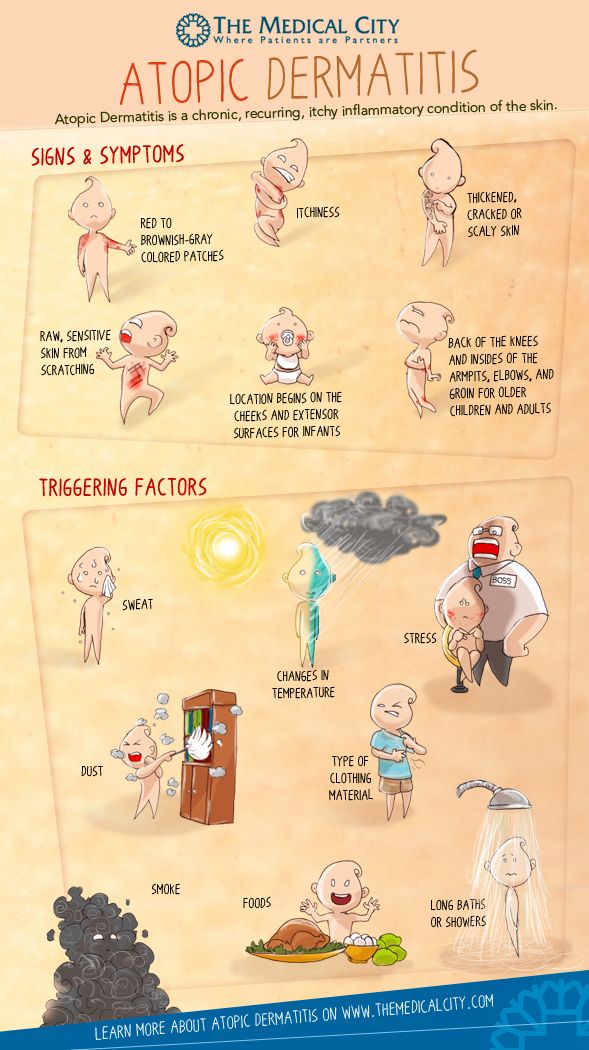
5. Tree nuts
Tree nuts could worsen eczema for many young children with a tree nut allergy. Examples of tree nuts include:
- almonds
- cashews
- walnuts
- pecans
Tree nut allergies are very common and may affect up to 4.9% of children and adults (18).
Unfortunately, tree nut allergies can be very serious, and some research suggests that more severe reactions to tree nuts are often associated with severe cases of eczema, asthma, and seasonal allergies (19).
In addition to avoiding tree nuts specifically, your child may need to avoid foods that contain tree nuts, including pesto, nut butters, coconut products, and certain types of cereals, cookies, crackers, or candies.
6. Wheat or gluten
Wheat is a type of cereal grain and a staple ingredient in many foods, such as bread, pasta, and baked goods.
Gluten is a specific protein found in wheat, barley, and rye that gives dough its structure and elasticity.
For those with a wheat allergy, consuming products that contain wheat may worsen eczema and could also cause other symptoms, including hives, asthma, and digestive issues (20, 21).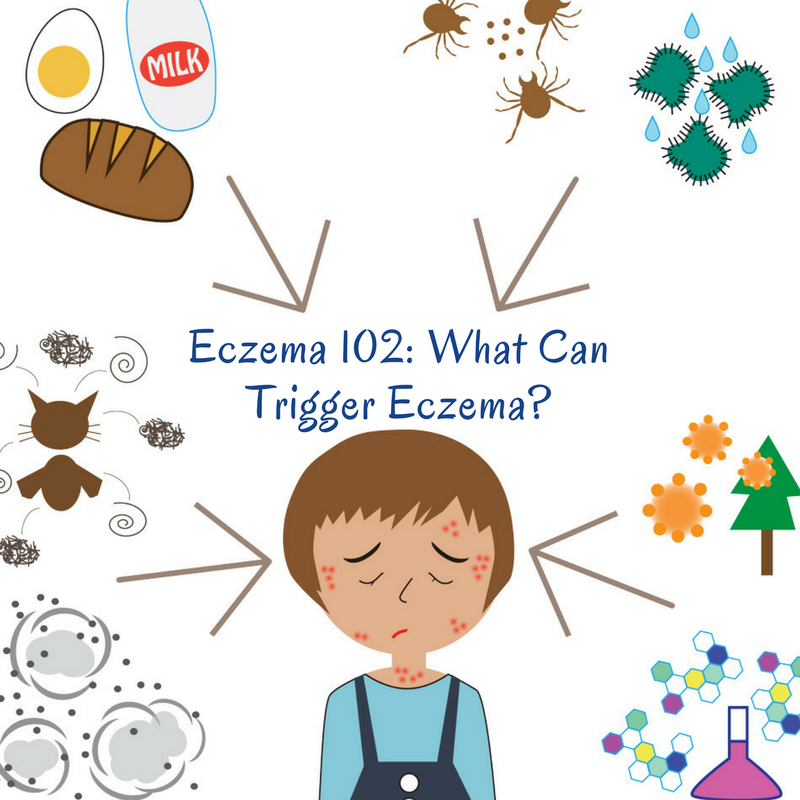
Eczema and skin rashes can also be caused by a sensitivity to gluten, as well as by celiac disease, an autoimmune condition that triggers an immune reaction when gluten-containing foods are consumed (22, 23, 24).
While there is no test available to diagnose non-celiac gluten sensitivity, your child’s pediatrician can use a skin or blood test to help determine if your child has celiac disease or an allergy to wheat.
7. Peanuts
Peanuts are a common allergen and are associated with several skin reactions, including rashes, hives, itching, and eczema (25).
Peanut allergies are especially common among babies and toddlers, as most peanut allergies appear within the first 2 years of life (25).
Additionally, some research shows that peanut allergies are more common among infants with moderate to severe eczema (26).
If peanuts cause flare-ups of eczema for your baby or toddler, try swapping other ingredients into your favorite recipes instead, such as seeds or seed butters.
SummarySome of the most common foods that cause allergies in infants and toddlers are dairy, fish, shellfish, soy products, wheat, peanuts, tree nuts, and eggs.
Several foods can be beneficial for eczema and may help reduce symptoms such as itching and inflammation.
For example, fruits and vegetables are rich in antioxidants, which are compounds that can protect against oxidative stress, cell damage, and inflammation (27).
Although studies in humans are still limited, some research suggests that reducing oxidative stress could play a role in managing eczema (28).
Increasing your intake of probiotics through fermented foods or supplements may also be helpful.
According to one review of 13 studies, certain strains of probiotics were effective at reducing eczema severity in children. These strains included Lactobacillus fermentum and Lactobacillus salivarius (29).
However, more research is needed because other studies have found that probiotics do not have a significant effect on symptom severity or quality of life for those with eczema (30).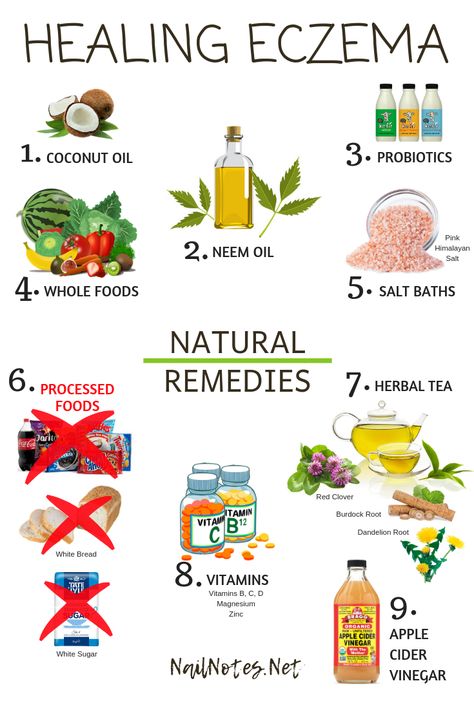
SummaryIncluding more foods rich in antioxidants and probiotics in your child’s diet could be beneficial for eczema, but more research is needed.
For many babies and toddlers, diet can play a key role in managing symptoms of eczema.
While certain foods can make eczema symptoms worse, others may decrease inflammation and oxidative stress, which could reduce symptoms.
However, it’s best to talk with a pediatrician or dietitian before making any changes to your child’s diet, especially because eliminating certain foods from their diet could make it harder for them to meet their nutritional needs.
Additionally, keep in mind that many other factors can contribute to eczema and some children may also need other types of treatment to help relieve symptoms.
Just one thing
Try this today: Consider experimenting with some at-home remedies for your child’s eczema. Check out this article for a few ideas to help provide relief for your baby or toddler.
What’s the Connection Between Food and Eczema Flares in Kids?
Written by R. Morgan Griffin
Could diet be to blame for your child’s eczema?
It's possible.
Up to 1 in 3 kids with eczema has a food allergy that could make symptoms worse. If you remove some choices, it could make a big difference.
But since finding food triggers is tricky -- and eczema can have lots of other causes -- don't jump to conclusions. Work closely with an allergist.
Which Foods May Trigger Eczema?
When you have a food allergy, your body reacts to a harmless treat as if it's a dangerous germ and attacks. Symptoms -- like swelling -- are side effects of your body's defenses.
Eczema doesn't seem to be an allergic condition, but reactions from food can make it worse in some kids. It’s more likely in babies and young children.
Some foods are more likely to bring symptoms. The common offenders are:
- Milk
- Eggs
- Peanuts
- Tree nuts
- Wheat
- Fish
- Shellfish
- Soy
While trigger foods can make eczema worse, experts don't think they’re really the original cause.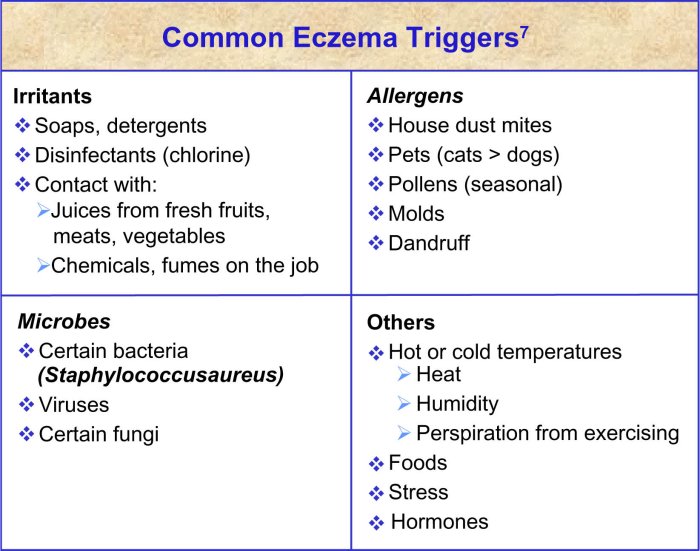 Instead, it seems to result from "leakiness" in the outer layer of skin that lets in irritants, germs, and allergens.
Instead, it seems to result from "leakiness" in the outer layer of skin that lets in irritants, germs, and allergens.
How to Find a Food Trigger
Some are obvious. If your child eats lobster for the first time and breaks out in hives 15 minutes later, it’s probably not hard to figure out.
But with eczema, it's often tougher. Symptoms may not show up for days after you eat something. If you do find a trigger food and get rid of it, that may help. Still, it may not make the eczema go away. Remember, 2 out of 3 kids with eczema don't have a food allergy at all.
That's why working with a doctor is so important. They can guide you toward the real cause through tests like:
Elimination diets. If your doctor thinks a food may be harmful, they may ask you not to give it to your kid for 10 to 14 days. Watch to see if it makes a difference.
Food challenges. After you've taken a food out of your child's diet, your pediatrician might want you to add a small amount back in to see if it causes symptoms. They may want to do this in the office, just in case your child has a reaction.
They may want to do this in the office, just in case your child has a reaction.
Skin testing. A doctor can take an extract of the food and use it to scratch the skin lightly. If the area swells up, that could be an allergic reaction. However, it's not always accurate.
Blood tests. RAST -- a radioallergosorbent test -- can check for special cells in the blood that signal specific food allergies. Again, it's not always accurate. Other lab tests can check for cells that trigger swelling.
Tracking down a food trigger can take patience and detective work.
Be methodical. Only eliminate one food at a time. If you ban dairy and gluten at the same time and symptoms get better, you won’t know which one made the difference. Use a food diary to keep track of what you get rid of, and the changes that brings.
Move slowly. A positive skin test isn't reason enough to cut out a food. Lots of kids test positive for foods that don't really cause symptoms. Plus, if you get rid of too many foods, you could cut out nutrients your child needs to grow and develop. So for their sake and yours, be sure before you take a food from your child's diet permanently. Work with your doctor.
Plus, if you get rid of too many foods, you could cut out nutrients your child needs to grow and develop. So for their sake and yours, be sure before you take a food from your child's diet permanently. Work with your doctor.
Keep using other treatments. Even if you find a trigger food, getting rid of it may not make the rash disappear. Stick with the other things your doctor recommends -- like skin ointments, lotions, and medicines. Continue to steer clear other allergens like dust mites, pollen, or pet dander, too.
Proper and Healthy Nutrition for Eczema
One of the names for a fairly common disease of eczema is atopic dermatitis. The disease is characterized by wet or dry rashes, which are accompanied by peeling and itching. Most often, eczema occurs on the palms and hands, on the soles of the feet, and less often on the face. As well as the treatment of the spine and joints, our clinic offers various treatment options and a doctor's prescription of a diet for eczema on any part of the body, including the hands, taking into account the results of the studies carried out and the definition of the type of disease.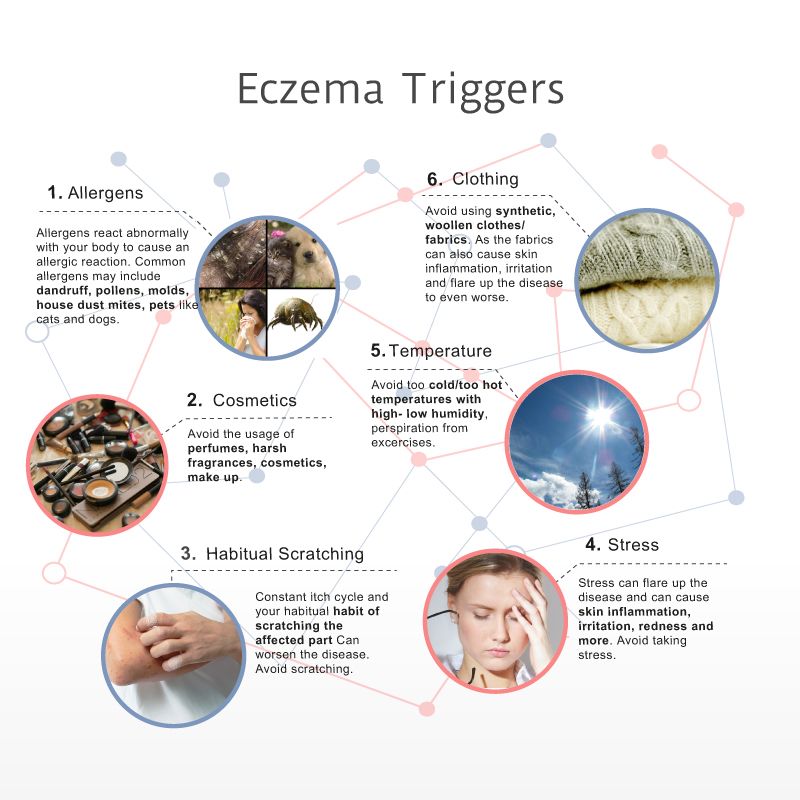
How the symptoms appear
The disease begins with local rashes such as "urticaria". Then tangible symptoms of eczema appear in the form of constant itching and skin burning. The following factors can become the cause of this condition:
- any external influences, for example, chemical or thermal burns, mechanical damage, etc.;
- somatic internal disorders: malfunctions of the endocrine system, gastrointestinal tract, genetic predisposition;
- allergic manifestations to various irritants: wool, pollen, food;
- nervous disorders and stress.
Most often this disease affects young women, less often - men. The danger of the disease lies in the fact that in the absence of treatment and adherence to a diet for eczema, it becomes chronic, which really reduces the chances of a favorable prognosis in treatment.
Foods to avoid
Proper nutrition for eczema is an effective addition to the main treatment.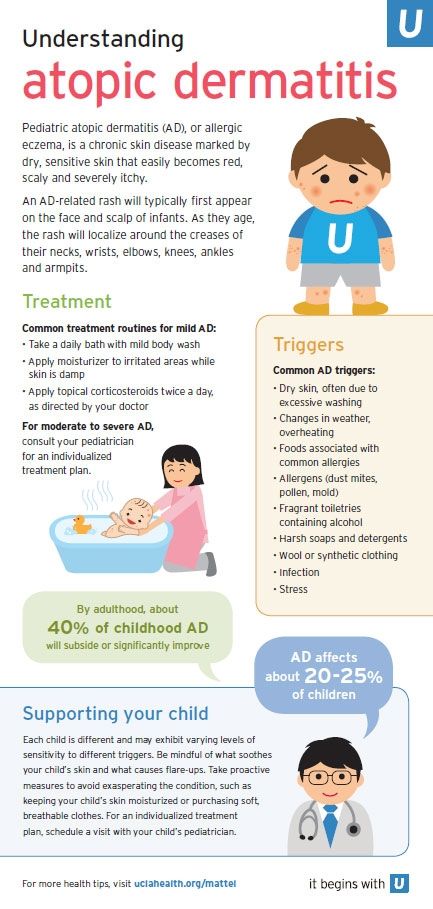 But to make sure which form the diseased has, you need a diagnosis and consultation with a doctor. The main thing that needs to be observed in the diet for eczema is to eat only those foods that are cooked in the right way, and the content of carbohydrates and fats in which does not exceed acceptable levels.
But to make sure which form the diseased has, you need a diagnosis and consultation with a doctor. The main thing that needs to be observed in the diet for eczema is to eat only those foods that are cooked in the right way, and the content of carbohydrates and fats in which does not exceed acceptable levels.
Be sure to take into account that many of the foods have the properties of allergens, so they must be excluded from the diet so as not to exacerbate the course of the disease. Basically, the list of such products is limited, but for many patients, due to eating habits, it is not easy to refuse them. However, a diet for eczema in adults will help avoid relapses, and make remission more stable. Therefore, it is recommended to exclude from the diet:
- flour confectionery containing honey, chocolate, butter;
- tangerines, grapefruits, oranges, lemons, pineapples, mangoes, as these fruits are strong allergens;
- smoked meats, fish and preserves richly flavored with spices;
- marinades, pickles, hot sauces, mayonnaise;
- all alcoholic beverages, including beer and low-alcohol drinks, as well as coffee.
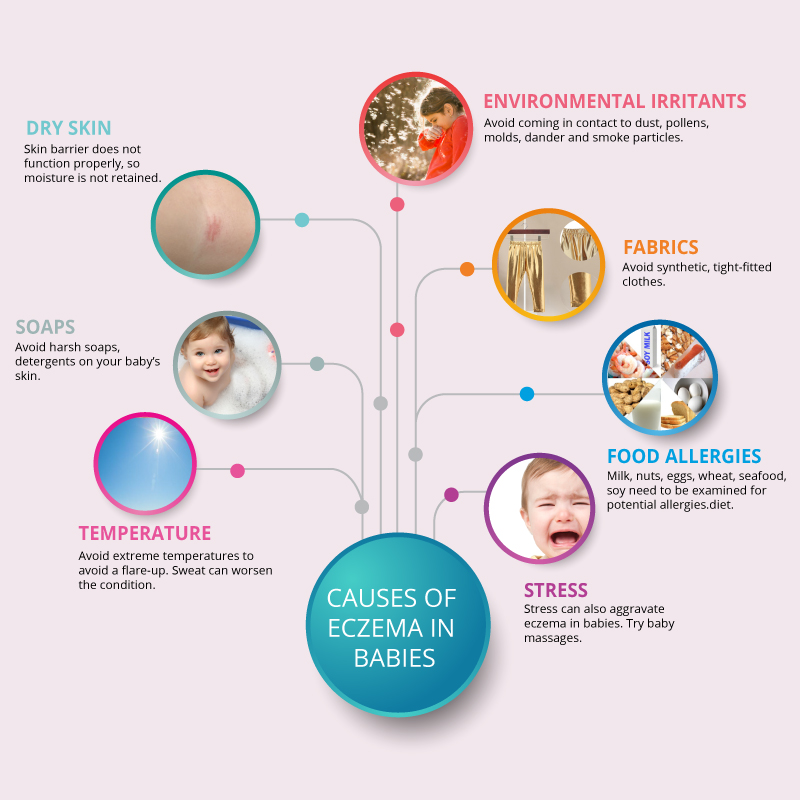
These are not so severe restrictions that you can get used to and not be hungry. On the contrary, following the doctor's recommendations regarding dietary nutrition helps patients to be more organized and responsible, and also to remember that only the activities carried out in the complex make it possible to get rid of the disease forever. After all, this skin disease is not a sentence!
Acceptable food products
If you find yourself with similar symptoms and manifestations of the disease, you should never self-medicate and prescribe treatment yourself. The doctors of our clinic will conduct an examination and give recommendations on how to make a diet for eczema, as well as an approximate menu, taking into account the course and form of the disease.
Which products are recommended? It must be taken into account that you can cook food only boiled, stewed, steamed. Among these products:
- lean meat of dietary grades: rabbit, chicken, turkey;
- hypoallergenic cereals for cereals and soups: buckwheat, rice, pearl barley;
- fish - only sea, fat-free and boiled;
- fermented milk products in the absence of allergies are allowed unlimitedly: cottage cheese, kefir, regular yogurt, yogurt, but only on the condition that they do not contain aromatic additives and preservatives.

High-protein, plant-based foods, in particular beans, are the best dietary option to get enough of the right amount of essential nutrients for the body. From beans, you can come up with many dishes that are high in calories, the presence of amino acids. These products can be eaten during remission or in the chronic course of the disease.
Acute period of the disease
First of all, in order to normalize the patient's condition, you need to take a special diet prescribed by the doctor, and adhere to it strictly.
Do not eat:
- red fruits, berries and vegetables (pomegranates, strawberries, cherries, tomatoes, beets, red peppers), which provoke a more severe course of the disease;
- exclude first courses and cereals cooked in meat broths.
It is necessary to include in the diet peas and cabbage, which contain a lot of vegetable protein, which the body needs instead of animal protein.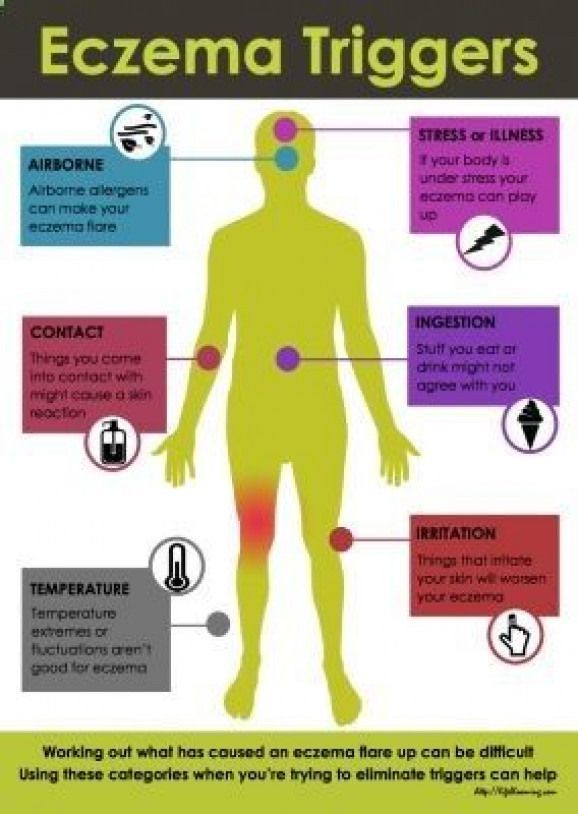 Be sure to eat carrots daily, rich in carotene, vitamins of group B and PP.
Be sure to eat carrots daily, rich in carotene, vitamins of group B and PP.
What foods cause eczema and atopic dermatitis - doctor eczema and atopic dermatitis – doctor
What foods cause eczema and atopic dermatitis - doctor - RIA Novosti Crimea, 02/21/2021
What foods cause eczema and atopic dermatitis - doctor
Most often, allergies are caused by foods that are included in the diet of a large number of people. If the allergen is not identified and excluded, eczema and... RIA Novosti Krym, 02/21/2021
/html/head/meta[@name='og:title']/@content
1
5
4.7
9000
7 495 645-6601
Federal State Unitary Enterprise “Russia Today”
HTTPS: //xn--C1ACBL2ABDLKAB1OG.XN-- p1ai/awards/
News
ru-RU
https://crimea.ria.ru/docs/about/copyright.html
https://xn--c1acbl2abdlkab1og.xn--p1ai/
News Crimea
1
5
4.7
96
news.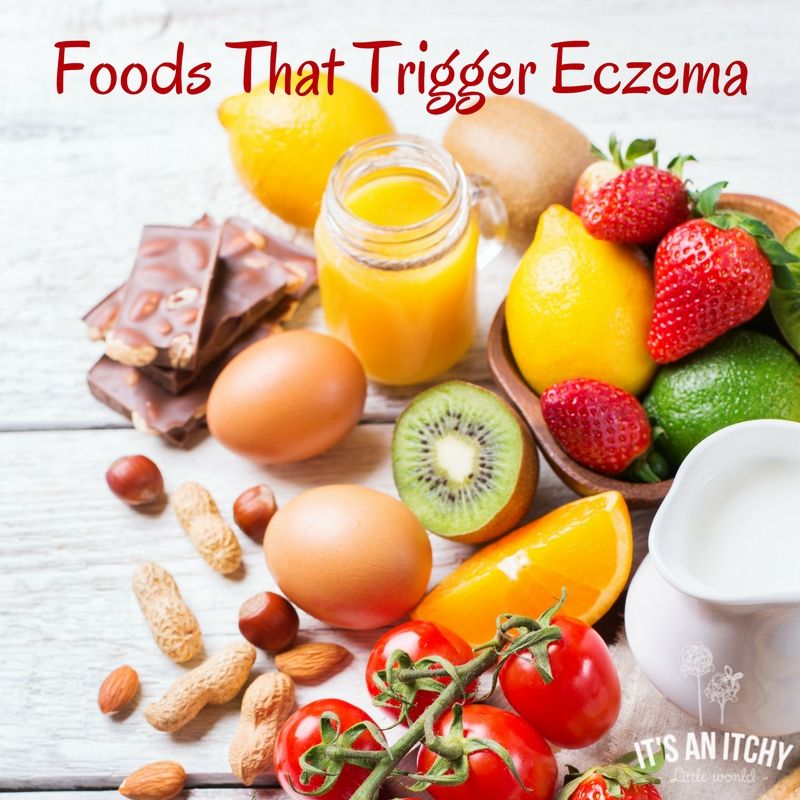 [email protected]
[email protected]
7 495 645-6601
FSUE MIA “Russia Today”
https: //xn--c1acbl2abdlkab1og.xn-p1ai/Awards/
RIA Novosti Crimea
5 9000 9000 4.7 9000 9000 9000 9000 9000 9000 9000 9000
7 495 645-6601
Rossiya Segodnya
https://xn--c1acbl2abdlkab1og.xn--p1ai/awards/
RIA Novosti Crimea 91002
5
4.7
96
7 495 645-6601
Rossiya Segodnya
https://xn--c1acbl2abdlkab1og.xn--p1ai/awards/
society, news
, February 21 - RIA Novosti Crimea. Most often, allergies are caused by foods that are included in the diet of a large number of people. If the allergen is not identified and excluded, eczema and atopic dermatitis may occur, immunologist Vladimir Bolibok warns, RT reports.
February 7, 2021, 08:32
Russia may become the first country without cat allergy – scientist
personal study," he says.

